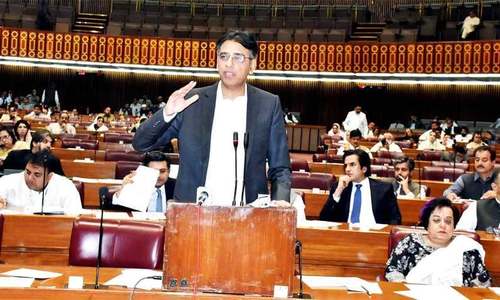ADB sees Pakistan’s economy slowing down in current fiscal

ISLAMABAD: Anticipating a one percentage point fall in the rate of growth and two percentage points rise in inflation during the current fiscal year, the Asian Development Bank has advised the newly elected government to address rising debt obligations, falling reserves and large twin deficits.
In its flagship Asian Development Outlook 2018 update, the Manila-based lending agency said the economy appeared slowing down and forecast GDP growth rate to touch 4.8 per cent this year, compared to 5.8pc in the fiscal year ending in June 2018.
It said Pakistan’s 5.8pc growth last fiscal was higher than the ADB forecast, but the outlook is clouded by a large budget deficit, a deteriorating current account deficit and falling foreign exchange reserves. “The growth forecast for Pakistan in 2019 is downgraded in light of a pressing need to deal with large budget and external imbalances,” it said.
Also, the ADB noted rate of inflation growing significantly to 6.5pc at the end of current fiscal against about 4.5pc last fiscal year.
Manila-based lending agency forecasts GDP growth rate to touch 4.8pc this year compared to 5.8pc in fiscal year ending in June 2018
The bank said Pakistan required mobilising substantial external financing to buy time for orderly reform to reduce the large external and domestic imbalances. Such resources can be acquired from bilateral and multilateral sources, the diaspora, or international capital markets. “The key challenges are to adopt the right reforms and achieve good outcomes to sustain public support,” the report noted.
The good thing is that Pakistan’s economy has time and again shown resilience and the capacity to bounce back, it said. Although formidable development challenges remain, the ADB expected the stability fostered by the smooth political transition and the new government’s strong commitment to focus on pockets of vulnerabilities and implement pro-job and socioeconomic development policies that will stimulate robust, sustainable growth in the years ahead, said ADB Country Director for Pakistan Xiaohong Yang.
The 4.8pc growth prospect is linked to success of the government in obtaining finance and on the strength of an improved security and energy supply, continued investment in the CPEC and other initiatives, and recognition of the need to rein in deficits. “Challenges to maintaining the growth momentum are tighter monetary and fiscal policies to contain domestic demand, currency depreciation, and tension in the global trade environment,” the ADB noted.
On the supply side, water shortages in some areas are likely to keep agricultural production below target in fiscal 2019. Growth in manufacturing and services will likely be affected by fiscal and monetary tightening. On top of dealing with macroeconomic imbalances, the new government faced long-delayed decisions on raising tariffs to contain rapidly rising and potentially disruptive inter-company arrears in the energy sector — so called “circular debt” that exceeds PRs1.4 trillion, or 5pc of GDP.
Average annual inflation is projected to reach 6.5pc in fiscal year 2019 because of currency depreciation and elevated international oil prices. Inflation accelerated sharply for both food and other purchases in the first two months current year to 5.8pc from 3.2pc a year earlier. The SBP increased the policy rate by 100 bps to reach to 7.5pc in July 2018 in an effort to contain the inflation pressure and is likely to continue further as part of its monetary tightening.
The new government needs to move swiftly to put in place its macroeconomic policies including fiscal, monetary, tax, and trade reform policies to promote financial stability and growth. Pakistan needs to institute mechanisms to increase competitiveness, attract private sector investments, and strengthen the ease of doing business as well as Pakistan’s position in the global value chain, the ADB said.
The bank appreciated a 5.8pc growth, highest in 13 years, and was credited to an uptick in industry, better agricultural crops, and an expanding services sector. Inflation remained moderate. However, with the new government considering policy options to implement its economic and social agenda, twin deficits widened by a rising import bill and higher spending continue to pose a challenge.
Published in Dawn, September 27th, 2018













































